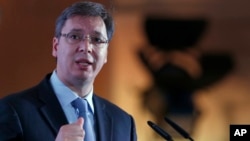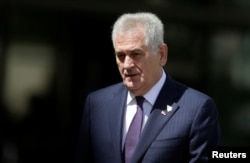The leadership of Serbia's ruling Serbian Progressive Party (SNS) decided on Tuesday to nominate Prime Minister Aleksandar Vucic as a candidate for the presidency.
The presidential election is tentatively expected in April and will pit the SNS's candidate against those from a fragmented and bickering opposition.
While the president's role is largely ceremonial, if he also controls the parliamentary majority he could then have huge sway over the government and a new prime minister.
In a live interview with state RTS TV, Vucic said he would accept the nomination to secure stability and continuity for the country, which wants to join the European Union.
"This is the most important [thing] and there's no sacrifice or risk I could not take because of that," he said.
The ruling coalition, which has a comfortable majority in the 250-seat parliament, can also appoint a prime minister without a popular vote.
"The president who controls the parliamentary majority, hence the government, is de facto the strongest political figure in the country. If Vucic preserves control over his party, his political power will be unlimited," said Nebojsa Spaic, a Belgrade-based media consultant.
Vucic said he has no plans to resign from his current post until the election date is announced and refused to say who could be his successor as the head of the government.
Earlier, Ivica Dacic, the head of the jointly ruling Socialist Party of Serbia welcomed Vucic's nomination as "the only rational and logical decision."
"His victory as a joint candidate guarantees the political stability of Serbia in the future," said Dacic, who himself served as the prime minister from 2012 to 2014.
The vote will be a key test of the popularity of Vucic and his economic reforms, which have been backed by the International Monetary Fund, as well as his bid to bring the country of 7.3 million closer to the European Union.
According to polls, Vucic would win the election in the first round with more than 50 percent of votes.
The party decided not to support the candidacy of incumbent President Tomislav Nikolic, a former ultranationalist and the former head of the SNS who started his five-year mandate in 2012.
Vucic's nomination will have to be formally approved by SNS's local party leaders and prominent members at a main board session scheduled for Friday.
The departure of Nikolic, who favors closer ties between Belgrade and Serbia's powerful ally Russia, could mean quicker moves towards EU accession and a further improvement of its ties with NATO, despite its military neutrality.
It was not immediately clear whether Vucic will decide to seek a parliamentary vote alongside the presidential election, though such a move is not mandatory.
In a statement, the SNS said Vucic, who is also the party president, now must start talks with his coalition partners to "try to secure wide popular support for the victory."
Zoran Stojiljkovic, a lecturer with Belgrade's Faculty of Political Sciences said that Vucic's nomination was "a rational move aimed at accumulating power in all levels" and securing a victory in the first round.
"What remains to be seen is who will be the prime minister, most likely Vucic will pick someone with a degree of authority, [good] ratings and with unquestionable loyalty," Stojiljkovic said.






